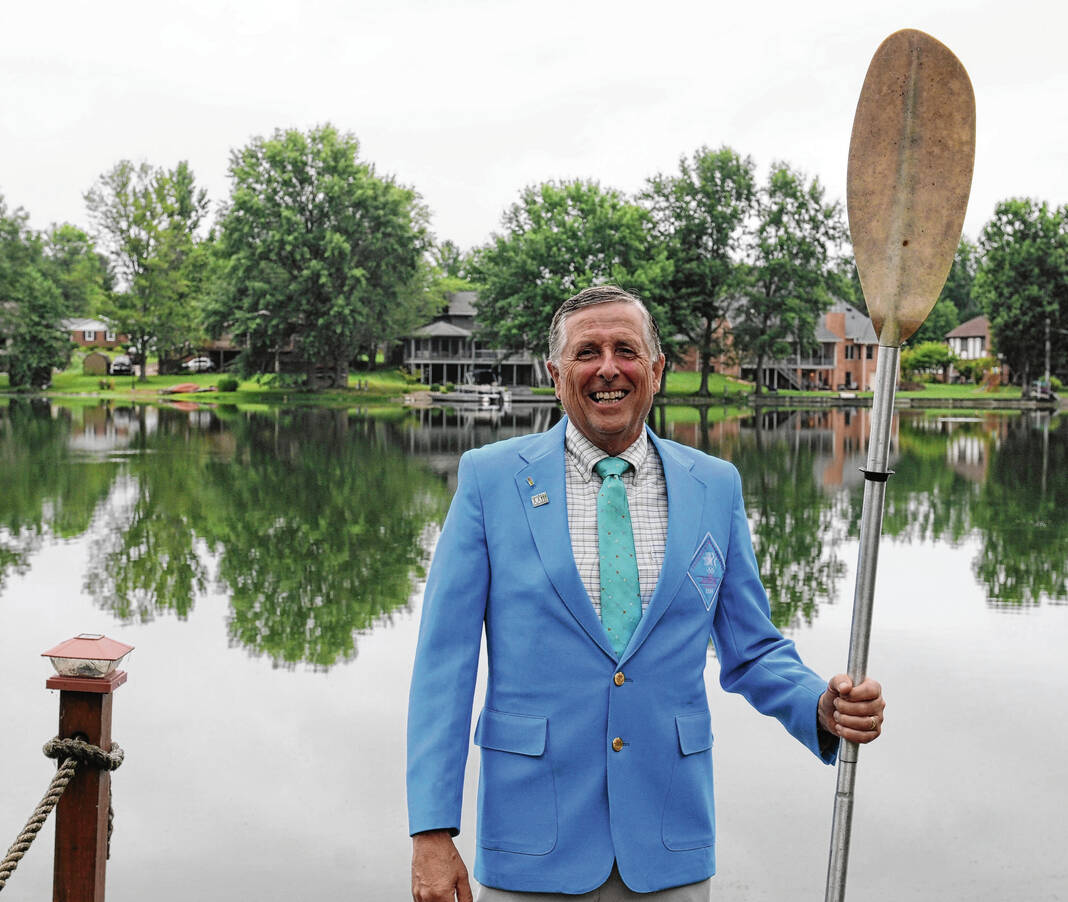
Tim Molinari lives in Mutton Creek with his wife, Bridget, and enjoys watching the 2024 Paris Olympics every night.
Erika Malone | The Tribune
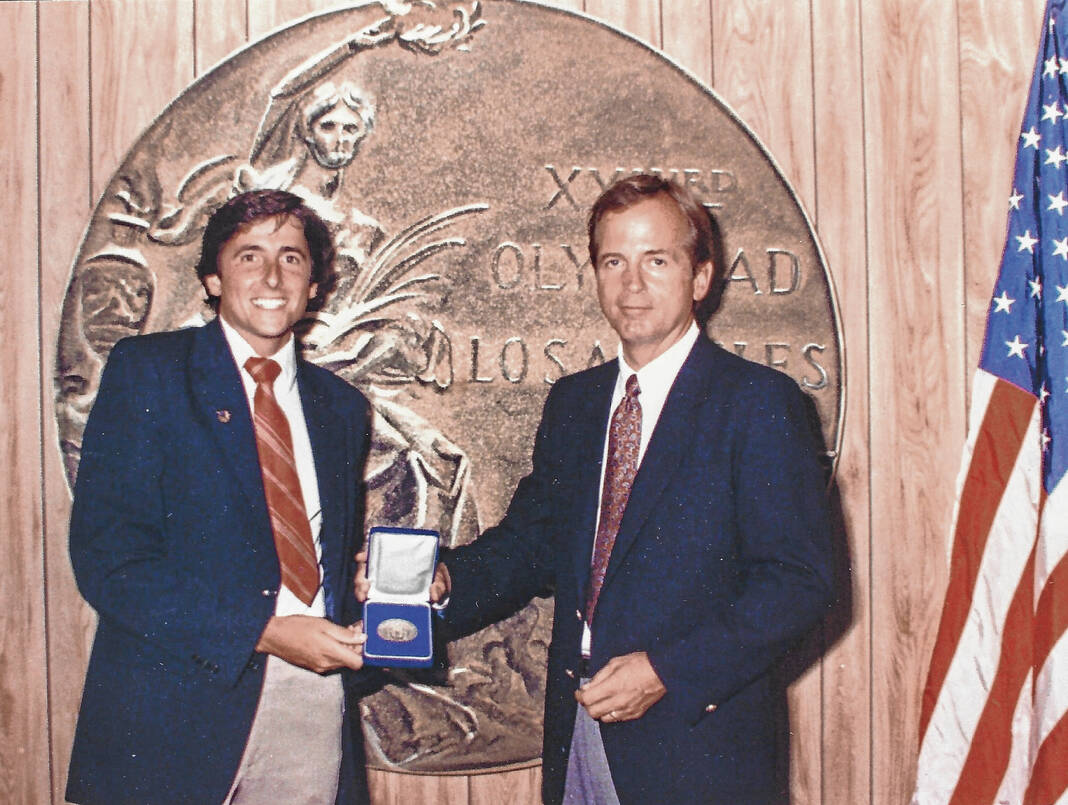
Tim Molinari, left, receiving a medal from Peter Ueberroth, president of the Los Angeles Olympic organizing committee, after the ‘84 games.
Submitted Photo
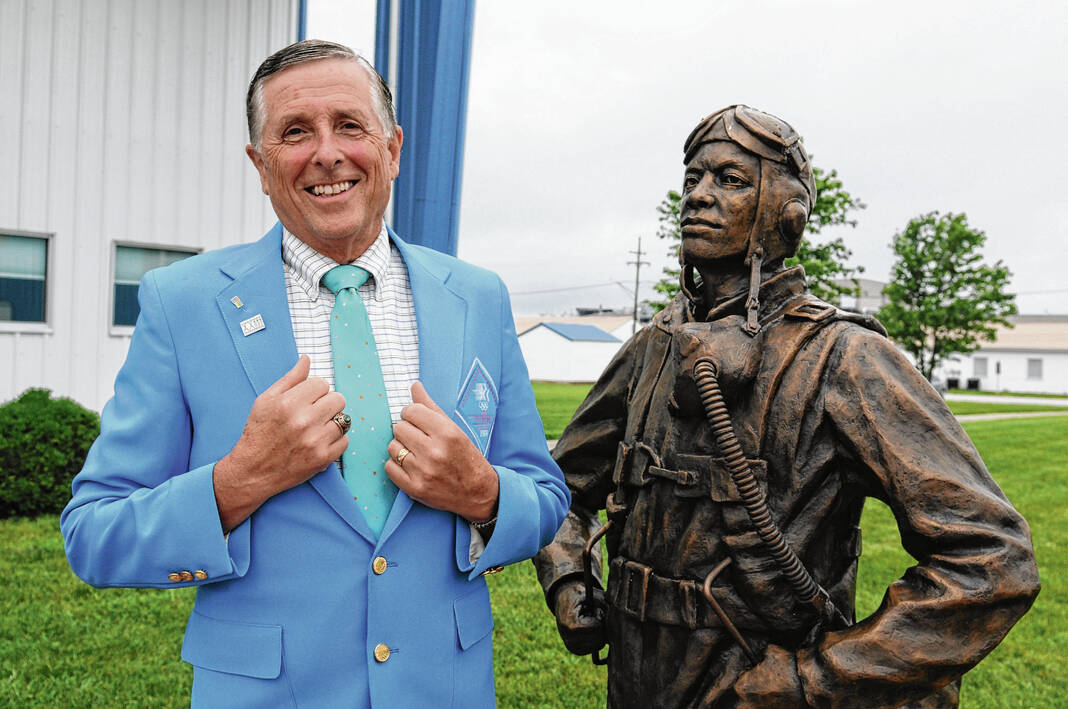
Tim Molinari in his ‘84 Olympic committee uniform and ring next to the Tuskegee Airman memorial at Freeman Municipal Airport.
Erika Malone | The Tribune
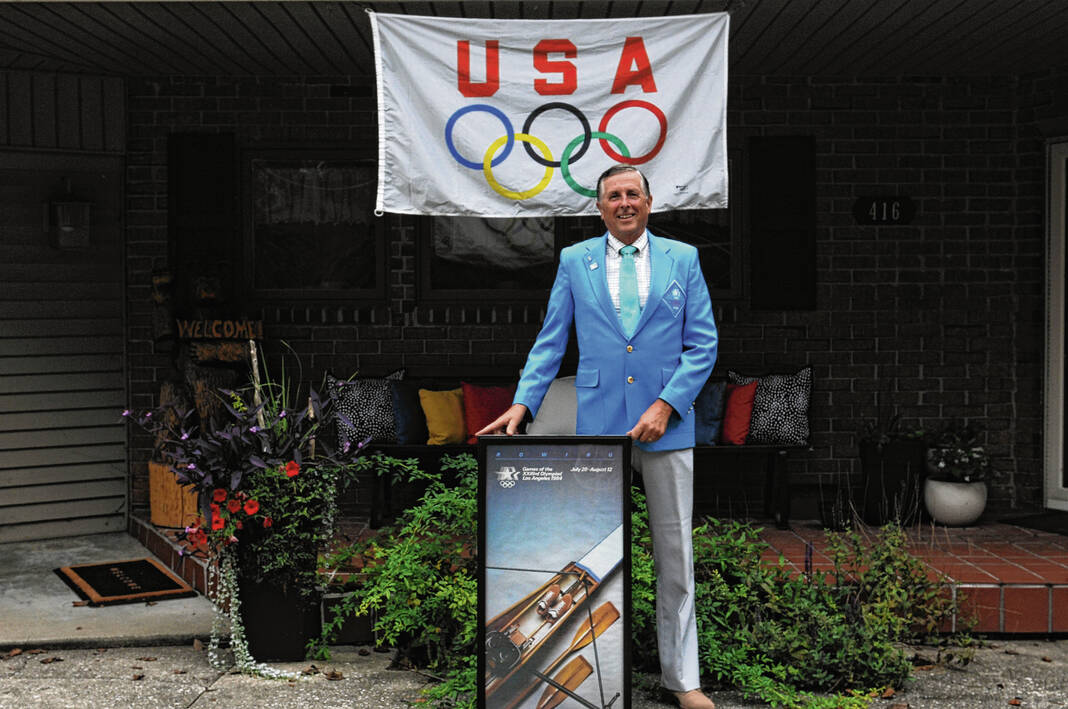
Tim Molinari pictured in front of his house with the Olympic flag and a poster from the rowing, canoeing and kayaking competitions of the ‘84 Olympics.
Erika Malone | The Tribune
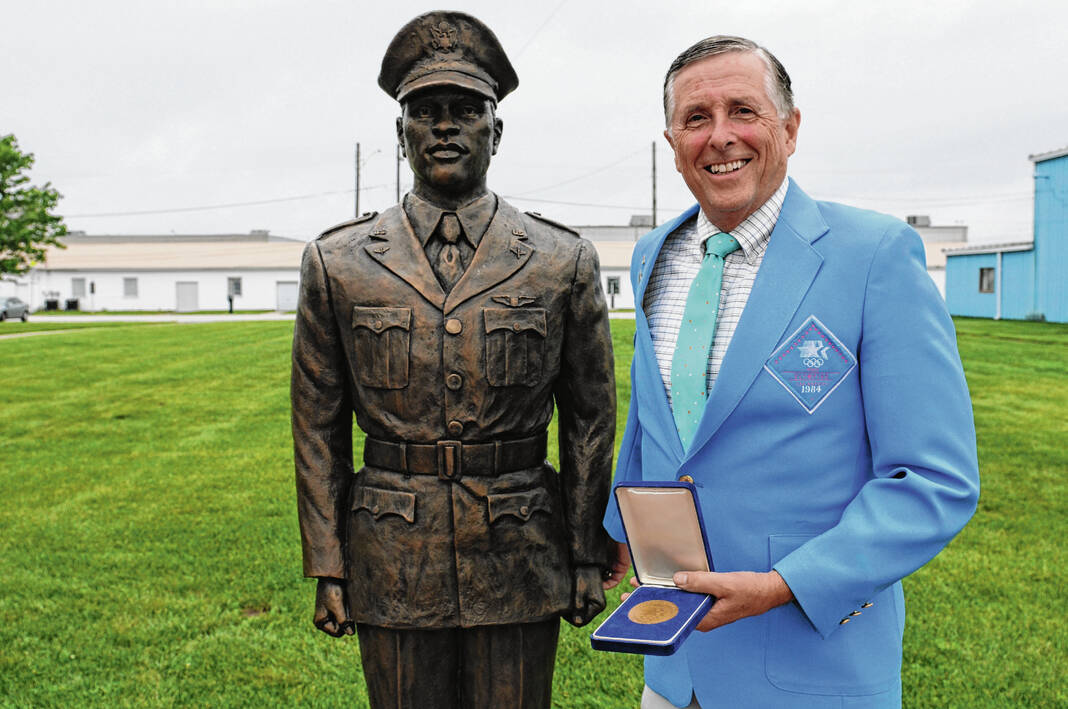
Tim Molinari with his medal in front of the Tuskegee Airman Memorial.
Erika Malone | The Tribune
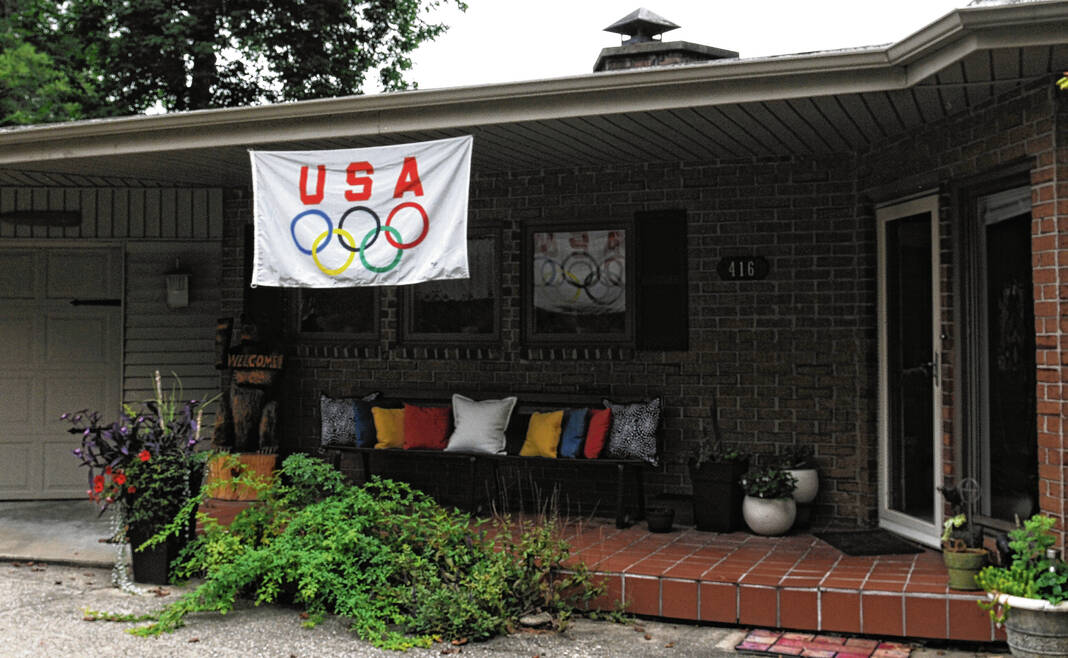
An Olympic flag proudly hangs in front of the Molinari House in Mutton Creek.
Erika Malone | The Tribune
At the Molinari residence in the Mutton Creek subdivision of Seymour, an Olympic flag hangs from the front porch.
The flag is displayed every four years during the Summer and Winter games. For Tim, it’s more than just a flag, but a reminder of his love for competition and memories of the 1984 Olympics in Los Angeles.
His admiration for the games, however, didn’t begin in Los Angeles, California.
“The first Olympic Games I can remember televised was in 1968 in Mexico City, Mexico,” he said. “I was enamored and just started following it.”
At 19 years of age between his freshman and sophomore year of college, Tim and a friend jumped on a Greyhound bus from Oregon, where he grew up, and traveled to Montreal, Canada, for the 1976 Olympics.
“We didn’t have a lot of money, but we were able get into the opening ceremonies without a ticket,” he said. “We snuck in.”
In a standing-room only section of the stadium, Tim watched the opening ceremonies in-person for the first time where his love and fascination for the Olympic Games was truly established.
“I remember my hair standing up during the ceremony when I see the torch being run in by a guy and a girl holding it together,” he said. “I was like, ‘Man, I made it. This is it’.”
Years later, Tim began travelling throughout North America and Europe with a notable nonprofit organization, Up with People. In a cast of around 120 kids from 16 different countries, the group would stage dances and performances promoting themes of multiculturalism, racial equality and positive thinking.
After nearly three and half years of performing at various events such as world fairs and Super Bowl halftime shows and only having two days off a month, Tim started to look for his next adventure.
“A girl in my cast whose dad was loosely involved in the Los Angeles Olympics organizing committee came to watch a few of our shows,” he said. “He was telling me how things worked, and it piqued my interest.”
In the fall of 1983, Tim reached out to the organizing committee and flew out to LA for an interview.
“The interview wasn’t great, but two weeks later the committee reached out again and wanted me to come back for another interview,” he said.
Tim interviewed for two departments, material logistics and accreditation. Before he left, he received offers from both departments and made the decision to work in material logistics for the rowing, canoeing and kayaking competitions for the Olympic Games.
At 27, Tim was 800th hire out of 33,500 people that helped organize the games.
“I went home to Oregon and told my parents, packed my car with some belongings and made my way to LA,” he said.
For five months, Tim slept on a cot in the living room of the apartment of two fraternity brothers and worked in a large helicopter assembly building that was filled with desks and cubicles.
Tim worked under the leadership of Peter Ueberroth, president of the Los Angeles Olympic organizing committee. The staff meetings were one of many highlights for Tim as he watched Ueberroth take a page from the Jordan Belfort handbook.
“Ueberroth would have us gather in the center of the room and he would stand on a desk,” he said. “White shirt, tie and sleeves rolled up and we had a meeting, just like out of the movies.”
After the 1976 Montreal Olympic Games, leaving the city in crippling debt of more $1 billion, only two cities bid to host the ‘84 Olympic Games — Los Angeles and Tehran, Iran.
After a failed referendum from the Los Angeles government to help fund the games, the Olympic committee turned to Iran. That country, however, was still reeling from political and economic corruption after the Iranian monarchy was overthrown and the Shah of Iran left for exile in 1979.
The International Olympic Committee and the U.S. committee decided to strike a deal and appropriate a certain amount of funds toward hosting the games, the first time in history.
“I always say Los Angeles really saved the Olympic movement because it was the first privately funded games and not done by the government anymore,” Tim said. “As we know it today almost all games now are corporately funded.”
The 1984 Olympic games left Los Angeles with a surplus of nearly $250 million, which served as a model for future games.
Reinventing the wheel, however, wasn’t easy with tight budgets and an unexpected boycott from Russia and other Soviet-aligned countries, with the exception of Romania, during that time period.
“When they announced they weren’t coming, we got a memo later that day to cut our budgets by 10%,” Tim said. “It was already bare bones, but necessity is always the mother of invention.”
Tim said he never forgot a conversation he had with Ueberroth, who was named the sixth commissioner of Major League Baseball after the 1984 Olympics and Time Magazine’s “Man of the Year”, in the men’s room after the boycott announcement.
“I looked over at him and he didn’t look very good like he had been having a rough day,” he said. “I asked him, ‘How are you doing?’ and he paused for a moment and said ‘No one said it was going to be easy’.”
The committee relied heavily on various sponsors who supported the games such as McDonald’s, Coca-Cola, M&M’s and General Motors to name a few. Tim said the staff was able to reap the benefits.
“I always had a coke on my desk and there were bowls of M&M’s everywhere,” he said.
As the games were coming up, the committee picked up the pace ordering equipment for the competitions.
Sixteen semitrailers of boat dock travelled to Lake Casitas in California where the rowing, canoeing and kayaking competitions would take place.
Tim’s job was to ensure the right equipment was ordered and it made the journey safely from their warehouses to the lake.
“I remember when Romania’s boat showed up to LA, there were concerns of someone with ill-intent toward Romania that would do something to their boat or the team,” he said. “An FBI agent came up to me and said he wanted to accompany me when I brought their boat to the lake.”
Tim said he had the opportunity to spend time with the athletes from many countries including the Argentina team in a mission to find their missing boat.
“The head guy from the team wasn’t happy and he was a pretty big guy,” he said. “I just wondered, ‘what is he going to do to me if I don’t find this boat’.”
Tim said watching USA win gold in the women’s eight final from a catamaran following alongside the race, was euphoric. Not only did Tim witness historical moments on the water, but also at track and field competitions.
From the press box, Tim watched as Mary Decker’s dreams of winning gold in the women’s 3000 meter final vanished when her heal was clipped by barefooted South African middle distance runner Zola Budd.
“I couldn’t believe I was there,” he said.
At the opening ceremonies, LA displayed all its splendor and created an intersection between sports and modern media.
President Ronald Reagan opened the games with a theme song composed by Grammy winner John Williams, O.J. Simpson was one of many notable athletes carrying the torch and future dream team members Michael Jordan, Patrick Ewing and Chris Mullin won a gold medal in basketball with the late IU coach Bobby Knight. Not to mention the unveiling of new technology such as jetpacks, emails and fax machines.
“They pulled every rabbit out of the hat,” he said.
After the games, Ueberroth awarded the departments with a medal and an Olympic ring for their commitment and dedication to organizing a successful Olympics. He said it’s one of the keepsakes he cherishes and is much smaller than a pair of award stands he “ended up with” for nearly 30 years after the games.
With LA hosting the games for an unprecedented third time in 2028, Tim said travelling back to watch the games again isn’t out of the question.
“I’m thinking about it,” he said. “I don’t want to try and repeat the experience because I know it would be different, but I still got energy and health.”
Witnessing the games from the front lines gave Tim a unique experience into the athletes and the sports themselves.
“These athletes are real people with emotions,” he said. “They are normal people who are dedicated to their sport and committed to their dream. I really think what the Olympics try to do through sport is bring the world together.”
Tim said the Olympics brings a unity to the world that right now is more needed than ever.
“Countries that are political adversaries are on the field together hugging and cheering for each other,” he said. “It’s a great thing, and I wish it was more often than every four years, but that is what makes it special.”
Being part of an Olympics that changed the course of history, Tim said he learned an important lesson that he carried with him to Jackson County.
“If the dreams are big enough, anything is possible and you find a way,” he said. “When I look at things now, I tend to look at the possibilities of succeeding instead of the reasons why I won’t.”
One of the dreams that was made possible is the establishment of the Tuskegee Airman Memorial at Freeman Municipal Airport in Seymour through an Eagle Scout project by his son, Tim.
“I remember when we had the dedication there was a 21-gun salute and then the band kicks into God Bless America,” he said. “There wasn’t a dry eye in the place, and I told my son that even though it was his Eagle Scout project he succeeded in something deeper.”
Tim said the same rings true for all of those involved in organizing the games.
“I was glad to be part of a talented group of people that put this together and really believed in what we were doing,” he said. “They left a legacy that was an example to the world.”
